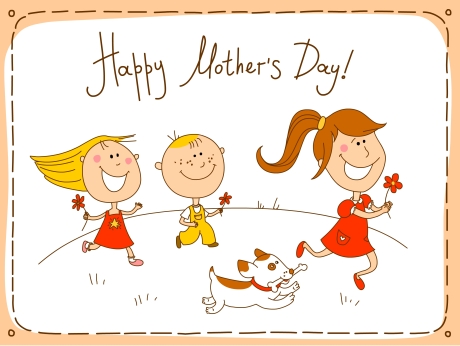WHAT DO YOU THINK?
Mothers are a unique species. Combine love, tenderness, courage, self- sacrifice, stamina and creativity and you get a creature you are ashamed of being hugged by in front of your friends… 🙂
Motherhood is a life-long mission. It begins long before the child is born, and I’m not talking only about the process of getting pregnant. Pregnancy changes everything. Hormones go crazy and a mother-to-be finds herself much more emotional than any other time before. She suddenly changes her habits and values and learns to listen to the needs of her unborn baby. Have you noticed that pregnant women tend to have a sort of distant expression in their faces? It’s because their minds and energy begin to concentrate on the very new important thing in their lives: their children. Their brains have been reset into a special mother-like mode, which is going to last until they stop being mothers.
Motherhood changes lives
If hormones go mad in pregnancy, they absolutely burst into a tornado-like cocktail after the baby is born. Recent studies reveal that the first contact between the mother and her newborn baby activates the same part of the brain as drugs. In other words, mothers get high, and their drug is their children. The emotions are indescribable2: love and fear, deep satisfaction, and pure weariness3 all mixed together and relieved by ocean of tears. Mothers finally find out that they don’t care about the countless sleepless nights and hours they spend googling about what to do to provide the best for their kids. They are often surprised by how strong they are and how far they are determined to go to protect their children. They often come to the conclusion that although they are not aggressive by nature, they are able to hurt those who would like to menace4 their kids.
Mothers and their duties
Mothers’ lives change dramatically. They used to be clerks or managers or shopkeepers. Now they are a bit of everything. All of a sudden they become nurses: both looking after the baby to keep it safe and healthy and watching him or her when they get ill. You know, wiping noses and giving medicine, comforting5 the crying children and checking on their temperature several times at night, for example, not to mention changing nappies6 and putting cream on the little irritated bottoms.
Mothers are cleaning ladies as well. All in all, small kids are disgusting creatures: they dribble and puke and poo and pee7 and make a mess. And usually it’s the mother who washes and wipes and cleans.
Mothers become entertainers. Do you think you can give a toy to a child and that’s it? Wrong! A small child’s concentration is poor, and so they get tired of what they are doing very quickly. And of course it’s the mother’s job to keep the baby busy and interested. So they brush up8 on their artistic skills and become actresses, painters, singers, dancers and sculptors. They play with toys again and make sure they try any game to keep their little angels happy.
Mothers have to learn how to cook whether they like it or not. They may forget about fast food for a long time, at least responsible mothers do. Little tummies9 are delicate and require proper feeding.
Mothers are also teachers. It’s up to them to teach their children the basic knowledge they need about the world around them. Kids need to be instructed to manage elementary conversations and good manners as well. And so mothers explain, motivate, drill and look for the best method to succeed.
Mothers need to be psychologists as well. They have to understand the child’s problems and needs and respond to them wisely, especially when their little angels turn into sulky10 teenagers. Have you ever noticed how much time mothers actually spend driving?
They become skilled taxi drivers taking their kids to and from school, courses and art lessons, not mentioning shopping and errands11.
Mothers are above all managers. Try to manage a family life – the partner and the children in combination with household duties and your own job! A mother’s life is an adrenaline adventure!
 Mothers who get it wrong
Mothers who get it wrong
Extreme attitudes are dangerous. It is always very difficult to keep your life in balance. When talking about mothers, it is even more complicated. The first extreme is the case when a mother puts her own interests before her kids. That does not mean that mothers have no right to have their own hobbies and that their own needs aren’t important. But there are mothers who neglect12 their kids, who prefer friends or addictions to their little ones. There are even “mothers” who ignore the urge13 to love and protect their children and are able to abandon14 them. The opposite extreme is possessiveness15. They are the mothers who would breathe for their kids and who think they can control every single aspect of their lives because they know best. They ignore the fact that children grow up and that they need more space for independent decisions. Perhaps that’s where all the jokes about mothers-in-law come from…. So next time you feel like talking back16 to your mum, think about all her responsibilities first. And make sure you bring her a bunch of flowers for Mother’s Day!
- How would you describe your relationship with your mother?
- Think about some more “jobs” motherhood involves.
- Is it possible to learn how to be a good mother in advance? Explain.
Girls: Would you like to be a mother one day? When? What do you worry about most?
Boys: Would you like to be a father one day? When? What are the qualities the mother of your kids should have?
Miroslava Dubanová
VOCABULARY
- vytrvalosť, životná sila – vytrvalost, životní síla;
- indiskraib∂bl/ nepopísateľné – nepopsatelné;
- wi∂rin∂s/ vyčerpanosť, únava – vyčerpanost, únava;
- men∂s/ ohrozovať – ohrožovat;
- utešiť, poskytnúť útechu – utěšit, poskytnout útěchu;
- meniť plienky – měnit plenky;
- slintať, vracať, kakať a pišať – slintat, zvracet, kakat a čůrat;
- vypilovať – vypilovat;
- brušká – bříška;
- nevrlí;
- vybavovanie, zariaďovanie – vyřizování, vybavování;
- zanedbávať – zanedbávat;
- /∂:dž/ naliehavá potreba – naléhavá potřeba;
- /∂band∂n/ opustiť – opustit;
- /p∂zesivnis/ snaha privlastniť si druhého – snaha přivlastnit si druhého;
- odvrávať, papuľovať –

